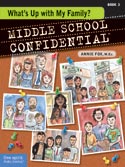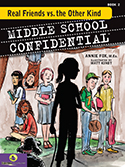Parenting Essays
Prepared or not, at age 18, our children graduate from our Parenting University. What do they take into the world with them when they go? Many parents say that they want their teens to become responsible young adults who are respectful, honest, self-reliant, self-sufficient, thoughtful, balanced, compassionate, caring, etc.
These are all wonderful parenting objectives! And as your child’s primary teacher, it’s your responsibility to make sure the lessons are learned. So, what, precisely are you doing every day to reinforce (and to model) these admirable traits? And what might you be doing (consciously and unconsciously) to undermine your own parenting objectives? Something to think about.
Here’s some more food for thought... a collection of my parenting essays written from 2004-2008 (my pre-blog years). Since July 2008 I've been blogging for parents of tweens and teens. Please check out my thoughts on 21st Century Parenting. Hopefully they will complement your own parenting goals and provide some useful topics of conversation within your family.
| June 2008 | Hello, Summer. Hello, You. — With school out and all that free time, what’s a teen to do? How about a little of nothing? By dialing schedules and external demands way back, teens (and parents) have a real opportunity to re-connect with their essential Self and with each other. |
| May 2008 | Emptier Nest? Open a New Window — Spring’s inevitable round of graduations, kids move into the next chapter of their lives. When high school graduates move on and out of the house, parents and younger siblings face emotional challenges. But if you start preparing now for your “emptier nest” you might discover opportunities for easing into the transition while starting your own new chapter. |
| April 2008 | That is better than this... or is it? — By constantly complaining about things, situations, and the behavior of others, we unwittingly encourage our already hyper-judgmental teens to do the same. Instead of critiquing everything and everyone, how about working together as a family to create a more positive attitude and more cooperation at home? |
| March 2008 | Teach your Children Well — All parents want their kids to grow up to be good people, i.e., compassionate, caring, thoughtful. Add to that life-skills like taking care of oneself and making well-informed decisions and you’ve got the makings of a fully functioning adult. But how, exactly, are you teaching the skills and attributes you say you want your kids to acquire? And what might you be doing to undermine your own parenting objectives? |
| February 2008 | It’s All in the Game, But What Are The Rules? — Despite the fact that many of us didn’t get a lot of useful guidance from our parents in the realm of dating, we’ve got to do much better for our kids. We need to arm them with factual information about sex. Equally important, we need to clearly communicate our values and our expectations so that our children have a foundation from which to make decisions in their own relationships. |
| January 2008 | Happy New (Gap) Year —What do you and your family really need this year? If increased stress levels are an indicator, parents and teens say they wish their lives would slow down. By consciously looking for “gaps” in your day-to-day routine, you can take momentary breaks, on your own and as a family, that can provide some of what we all want and need. |
| December 2007 | A Gift Beyond Measure — With gift giving season upon us and a savvy barrage of ads competing for our teens’ hearts and minds, what does a loving parent place under the tree or beside the menorah? What is it they really want? What did you want from your parents when you were their age? |
| November 2007 | Someone is Always Not Happy — We all have moments, days, or weeks when we feel emotionally out of control. Anger, sadness, or fear can overwhelm. You help yourself when you calm down and think about what’s going on and what you can do about it. But sometimes, the feelings are too intense and your mind won’t give you a breather, not even for a minute. When you or your teens are stuck in one of those mental whirlpools, maybe the best thing you can tell yourself and your kids, is to hold on and ride it out. |
| October 2007 | Halloween and the Art of Faking It — When young people mask their feelings or hold themselves back from being themselves they give away their power. Teens who do this consistently may damage their sense of self and compromise their ability to make healthy choices. When parents offer clear-headed understanding and compassion of peer approval addiction, we encourage our teens to fly. |
| September 2007 | Prepare to Stop — It’s Back to School time and once again we’re locked into a schedule. There’s barely any time during the week when we don’t have to do something or get somewhere right now! Gone until next July are the deliciously unstructured days of summer... Or are they? Instead of resigning yourself to grabbing food on the run and settling for snippets of conversation, we can disentangle ourselves from The Schedule and reclaim some of the summer-like pleasures of just hanging out with the family. |
| June 2007 | Thanks, Dad — Dads don’t get the hearts and flowers or the respect that moms do. But real dads absolutely deserve our appreciation. They’re the ones who consistently show up and connect and stay involved with their kids and grandkids. Real dads provide their sons and daughters with the protection, support and encouragement they need to develop self-confidence and self-reliance. You know who you are. Happy Father’s Day. |
| May 2007 | Thanks, Mom — For the first 18 years of our lives, chances are we spent a lot of time with Mom. She told us plenty of things she wanted us to remember. Plenty more we picked up simply from observing. In honor of Mother’s Day, how about taking a look back on the legacy you got from your mother? You might be surprised at what you internalized and how that’s informed the person and the parent you are today. |
| April 2007 | I’ll Have Some Extra Sunshine and a Little Peace of Mind, Please — The best we can do for our kids as they race toward adolescence is to get out of their way. They need opportunities to be independent — otherwise they fail to develop confidence in their ability to manage their own lives. Shifting away from doing it all for them may mean a loss of peace of mind… but parenting isn’t about your serenity, it’s about raising fully functioning adults. |
| March 2007 | She’s Your Daughter and She Needs You — Research is showing that environmental factors are causing girls to begin puberty earlier than ever. One very unfortunate result is that little girls with grown up bodies are finding themselves in sexual situations without a clue about what is appropriate behavior. By talking openly and consistently making your values and expectations clear you can provide a powerful counterbalance to the influence of media sex messages aimed at teens. |
| February 2007 | Show Us the Love, OK? — We do a disservice to our kids when we fail to teach them that helping out is what family partnerships are all about. By changing your perspective on chores and clarifying your expectations you help your kids feel like contributing members of the family team. |
| January 2007 | The Winds of Change — Each new calendar year marks the passage of time and brings inevitable changes to our families. If you’ve got tweens or teens, you’re probably seeing dramatic physical, emotional, and psychological changes all the time. By paying attention to what your kids need from you, moment-to-moment, you can help them in their own self-discovery. |
| December 2006 | Love’s All You Need – So Why Not Ask For It? — Emotionally healthy people recognize when they need comfort and support. But when we operate under the assumption that we can always do it “on our own,” we miss so many opportunities to be loved and nurtured. Parents ought to help kids articulate their emotions. This teaches them that expressing feelings is one way we connect with those we love. It’s also shows them how to get their needs met in a relationship. |
| November 2006 | Kids Aren’t Crops — A healthy relationships is a two-way street based on mutual trust, respect, honesty and open communication. A parent-child relationship can be very healthy and loving while mostly flowing in one direction. As a parent you are primarily the Giver and your child is primarily the Taker. And that’s exactly the way it should be. |
| October 2006 | Why Worry? Why Not? — Sure we live in troubling times. But you and your kids have enough real stuff to handle without creating imaginary problem scenarios to worry about. And yet, at times, we all worry. How about teaching them that out of control worrying doesn’t help them or anyone else? |
Note: Most of the following Parent Forum Essays have not yet been updated to our current design. | |
| September 2006 | Some Kind of Help — Young children benefit when parents are involved in their education and available to help with school-related challenges. But for kids in 6th grade and beyond, the most “helpful” parents recognize a young adolescent’s need to do more and more for himself. |
| July/August 2006 | We are Family — Family history research is easier than ever thanks to digital photography, email, and the Net. By recording memories from the older generation and surfing genealogy sites, you and your kids can have a whole lot of fun while reinforcing the biological and emotional links connecting all family members. |
| June 2006 | Is Anybody Home? — Kids who feel most at home with themselves are likely to feel at home wherever they are. To help launch teens along their chosen paths, parents need to encourage independence while nurturing the spirit. It also goes without saying that parents who are self-confident and adaptable to change provide healthy role models for dealing with life. |
| May 2006 | Real Friends vs. The Other Kind — All kids need to learn what it takes to be a good friend so they can evaluate their own actions and those of others. When middle school pressures turn even BFFs (best friends forever) into enemies, parents ought to help kids understand the power of their own choices. |
| April 2006 | What are Teens Doing Online Anyway? — 21st Century kids are often far beyond their parents in their knowledge of digital technology, but we know way more about life. So we’ve got to help them understand how to apply real world rules to virtual reality. |
| March 2006 | Don’t Add to the Garbage — Work for world peace by helping your kids understand the ethical consequences of their day-to-day choices. Let them know that it’s never okay to add to the garbage – in the lunchroom or amongst their peers or siblings. |
| February 2006 | Focus on Listening — Use the intense focus of Olympic athletes to inspire you to move away from doing a million things at once toward becoming a better listener. |
| January 2006 | A Cleaner Garage and Other Resolutions — Instead of hoping for the will power needed to help you stick with to your New Year’s resolutions how about tapping into the power of family support? |
| December 2005 | The “Please Don’t Buy Me Any Stuff” Gift Guide — Black Friday reports of trampled shoppers left me disturbed and wondering how the impulse to give a gift had turned into a dangerous obsession. |
| November 2005 | Time Out for Your Family — Much more than our own teen years, our kids’ lives are filled with social and academic pressures that can push them to the limit. The best we can do for them is to make sure that home is a refuge from the outside world. That and regularly scheduled Family Time can provide parents and kids with the support, comfort, and resilience they need to cope. |
| October 2005 | Clean Anger vs. the Other Kind — Even though most of us felt demeaned when our parents yelled at us, when our kids push our buttons, put-downs and insults are often the first things out of our mouths. There’s a much more constructive way to express your frustration with your kids – one that’s sure to teach them more of what you really want them to learn (respect, self-control, and conscious choice-making). |
| September 2005 | Highly Functional Families—Compassion begins at home — Getting together with extended family can make us wonder if we’ve really grown up at all. Understanding why our buttons get pushed by our parents, in-laws, and siblings, can help us get closer to them and teach our own kids that family dynamics aren't carved in stone. |
| July/August 2005 | Family Vacations—Happy teens make for happier times — The older your kids get the less they like family vacations unless you start including them in the planning. By listening openly to their ideas and treating them with respect, you're rewarded with a bunch of happy campers and a much more enjoyable family vacation. |
| June 2005 | Summer Daze—How much goofing off is too much? — Teens need a summer break, but that doesn’t necessarily mean 10 weeks of vegging out in front of the TV or computer. If you’ve been unsuccessful motivating your teen by yelling, “Why don’t you do something constructive?!” here’s a less stressful way to help your son/daughter create a summer plan that you’ll both feel good about. |
| May 2005 | “But I work better under pressure!” — By helping your teen stay on top of end of term academic requirements now (it’s early May!) you can help him/her and the whole family. Teaching and role modeling good organizational skills, keeps down stress levels and gives your teen a self-confidence boost that he’ll take with him into the new school year. |
| April 2005 | Show Me Some Respect! — You may believe that a show of force in the face of a defiant teen teaches him/her to respect you. But what you’re teaching when you lash out in anger has nothing to do with respect and everything to do with fear, loathing and the wrong way to parent. |
| March 2005 | My Life Sucks Right Now vs. The Big Picture — A teen’s brain isn’t fully developed in the area dealing with long-term planning — they can’t take the “long view.” If they’re dealing with a major disappointment or betrayal, they'll be challenged to imagine anything but what they’re feeling right now. Enter a loving, caring parent (that’s YOU!). By first acknowledging their current unhappiness, you can help your teen begin to take the broader view. |
| February 2005 | Love is in the Air — If your teen feels left out of the Boyfriend/Girlfriend Zone don’t let him or her suffer in silence. We’ve all felt desperate to be part of a couple, and convinced that no one would ever fall for us. When you share your own romantic disappointments from adolescence, you ease your son or daughter’s pain, and increase the bond between you. |
| January 2005 | New Year, New Choices — One of your key parenting tasks is teaching your kids how to make good choices that reflect their own personal values. In order to help them develop into clear, independent thinkers, you have to back off and let them practice making their own decisions and learn from the process. |
| December 2004 | Holiday Stress and How to Manage It — Striving to live up to Grandma’s perfectly shaped sugar cookies or Mom’s perfectly trimmed tree is STRESSFUL! Let go of unrealistic expectations and give your family the gift they want most this holiday season — YOU (being your most loving and relaxed self). |
| November 2004 | Family Meetings — Regular family meetings offer golden opportunities for you and your children to learn more about each other, to become better listeners, to learn the art of compromise and to re-affirm your ability to help one another resolve problems. |
| October 2004 | Beyond Father/Mother Knows Best — By sharing the truth of your emotional experience in appropriate ways, you can give your kids the chance to exercise their compassion and to grow beautifully toward adulthood. |
| September 2004 | Annie’s 10 Tips for Improving Parent-Teen Relationships — Be there for your teens. Be honest, set clear expectations, be consistent with praise and consequences, and let go, little by little. That's how to encourage good judgment in your teens and create a family dynamic that supports and nurtures everyone. |
| August 2004 | A New School Year of Parenting Challenges — Effective parenting of middle and high school students is one of the most important and challenging jobs there is. We’re offering a place to come together as an online parenting education and support network. |
















